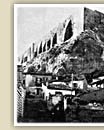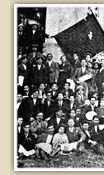 The percentage increased in the first two decades of the twentieth century, initially
with the presence of landless peasants and poor farmers from the countryside and later, in the 1910s, with refugees from war-torn areas or from territories under
foreign domination. These population groups gathered in the larger urban centres hoping to be engaged
in manufacturing or one of the first industrial complexes. Others choose to emigrate
or survive on the margins of urban industrial society.
The percentage increased in the first two decades of the twentieth century, initially
with the presence of landless peasants and poor farmers from the countryside and later, in the 1910s, with refugees from war-torn areas or from territories under
foreign domination. These population groups gathered in the larger urban centres hoping to be engaged
in manufacturing or one of the first industrial complexes. Others choose to emigrate
or survive on the margins of urban industrial society.
The development of the industrial sector remained exceptionally slow at least until 1922. The main
body of workers was engaged in the traditional branches of manufacturing such as
tobacco production and other small enterprises. Their immediate rural
origins, their ownership of small landed
property in their home villages and their expectation of acquiring a private house, no matter the state, shaped their consciousness into that of
dependent workers. Another contributory factor was
the practically non-existent social differentiation between labourers and their employers,
who were often small businessmen of petit bourgeois descent. Their living conditions and
social models did not differ substantially.
|
 |

Patron-client relationships, access to civil service posts
and to public education (especially secondary education), developed expectations of social mobility and averted the formation of a class-based proletarian
cosnciousness amid the (not numerous) labouring class. Gradually, in the late 1900s and early
1910s organized unions were formed, especially through the
establishment of Labour Centres (in Athens, Piraeus, Volos, Larissa and Kerkyra) or other
groupings such as the League of the Working Classes of Greece, or the Pan-Hellenic Labour Federation.
The Socialist Labour Federation, in which the Jewish element was prevalent,
was founded in Thessaloniki in 1909.
In 1918 the General Confederation of the Workers of
Greece (GSEE) was founded. The legislative reforms of Venizelos
had a positive impact on the institution of labour law and unionism.
The labouring and industrial urban classes encountered several crucial problems. Wages were very low, especially for unskilled
labourers. In the period 1912-22 there was a steady decrease in wages in relation to inflation. To this was added the phenomenon of seasonal employment but also of seasonal unemployment
or semi-employment. The number of unemployed reached very
high levels and the ensuing decline was so serious that it became the object of state concern towards the end of the period.
|
 |
